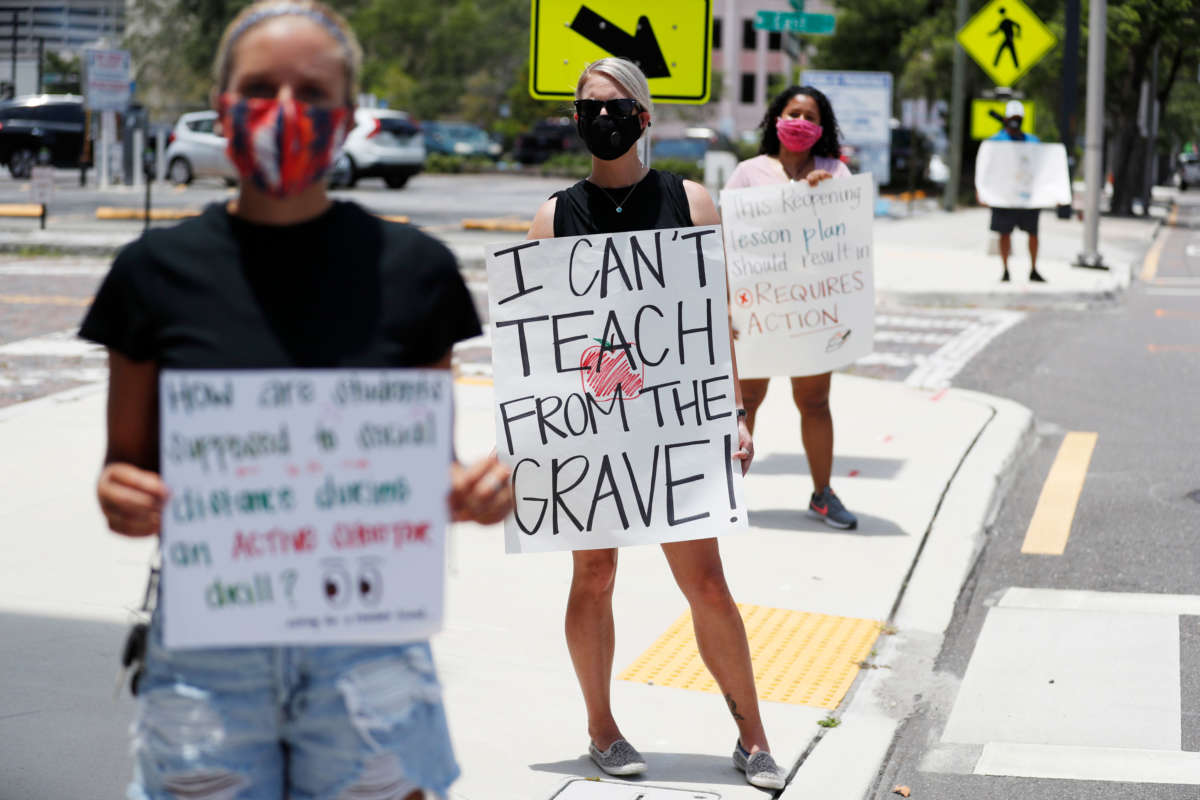As school districts across the country begin to decide what their plans will be in the fall — to reopen their doors amid the coronavirus pandemic’s continued rise, or to stick with a virtual learning curriculum that was utilized in the spring — many teachers and their unions are voicing support and demands for the latter option.
Hundreds of teachers in Arizona, many donning red t-shirts they had worn during a walkout in 2018, protested in cities across the state this weekend in their cars, holding signs and speaking out in favor of keeping schools virtual for the time being.
Gov. Doug Ducey, however, signaled last week that he believes schools could reopen in his state, adding that he had no qualms about sending his own kids back in the fall.
But teachers in Arizona are advocating against that move, especially in the wake of a COVID-19-related death of a teacher who was part of an in-person summer school curriculum this year.
Kimberly Chavez Lopez Byrd, 61, died on June 26, after she contracted COVID-19 while teaching in a Gila County classroom. Two other teachers in the summer school program also contracted the disease, in spite of all three wearing gloves and masks, and regularly using hand sanitizer.
“My main thing is if we can’t stay safe, how are our students going to stay safe?” Angela Skillings, one of the other teachers who was also infected, said to a local news affiliate.
Teachers in several other states are also demonstrating against reopening this fall. Several teachers’ unions in Wisconsin sent a letter to Gov. Tony Evers, urging him to announce a statewide delay in reopening schools for in-person instruction come September, when teaching is set to commence.
“The classroom is where every single educator wants to be this fall, but with no containment of Wisconsin COVID-19 cases, a virtual reopening for public schools is necessary,” their letter to Evers read.
Teachers in Texas also protested at the state capitol building in Austin over the weekend, convening in a caravan of vehicles that circled the block. They followed up that protest with a socially distant sit-in on the capitol lawn as well.
“We are desperate to return to school, but it must be safe for our children, our families, our educators, and all school personnel in Texas,” protest organizers wrote on the Facebook event page.
And in Mississippi last week, teachers made several demands to lawmakers that they said should be met before classrooms can reopen. Among them, they want a delay in reopening until September 1, as well as for districts to adhere to Centers for Disease Control and Prevention (CDC) guidelines before classes can resume. Additionally, they want schools fully funded to ensure teachers don’t have to pay for their own personal protective equipment.
These protests, however, are not being met without opposition. While many parents empathize or agree with teachers about the need to keep schools closed in the fall, others are noting the enormous difficulties that doing so would bring onto their own lives.
“It has to be asked, what do the essential workers do?” parent Scott Allen said to The Tennesseean about the issue. “The single moms who have to go work or the single dads, what do they do with their children?”
Other parents noted that they’re not equipped to dedicate the time or energy they need to educate their kids. In Palm Beach, Florida, parents even staged a protest against the idea of resuming virtual education.
“I can’t do it. I feel like I’m failing as a mother, and they’re failing as teachers,” Jordan Westcott, a mother whose son has a special plan for his own learning needs, told The Palm Beach Daily News. “When we were doing virtual school, each day would end in tears. There’s no way I can do it.”
Concerns over how some students fare in online learning environments, particularly those in underserved communities, have led to questions about what can or should be done this fall; whether schools should offer instruction online, or in-person, or take a hybrid approach. Many students have fallen behind as a result of schools closing this past spring for a variety of reasons, including lack of access to technology and needed special instruction, and it’s highly possible that those same problems will persist if virtual learning continues.
Join us in defending the truth before it’s too late
The future of independent journalism is uncertain, and the consequences of losing it are too grave to ignore. To ensure Truthout remains safe, strong, and free, we need to raise $17,000 by midnight tonight. Every dollar raised goes directly toward the costs of producing news you can trust.
Please give what you can — because by supporting us with a tax-deductible donation, you’re not just preserving a source of news, you’re helping to safeguard what’s left of our democracy.
